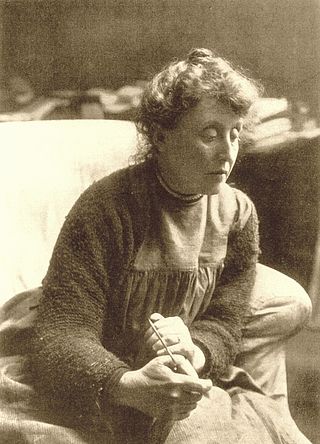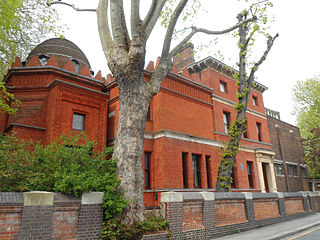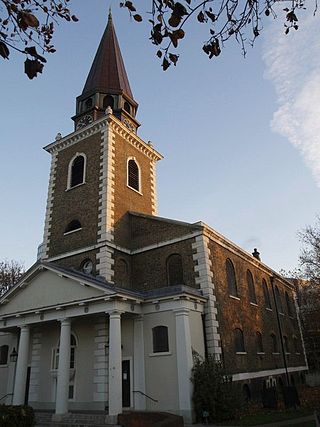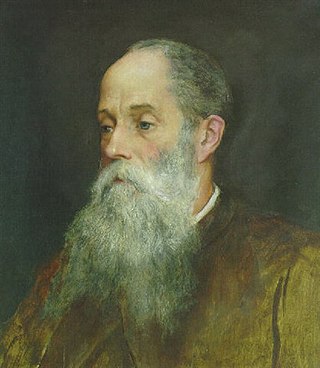
Old Battersea House is one of the oldest surviving buildings in Battersea, South West London and is Grade II* listed. [1] It was built around 1699, [1] and was once rumoured to have been designed by Sir Christopher Wren. [2] [3]

Old Battersea House is one of the oldest surviving buildings in Battersea, South West London and is Grade II* listed. [1] It was built around 1699, [1] and was once rumoured to have been designed by Sir Christopher Wren. [2] [3]
Until the 1930s, the building was known as Terrace House. [3] It was built for the "naval administrator" [3] Samuel Pett, [4] and was most likely completed in 1699. [3]
Between 1840 and 1926, the house was occupied by a teacher training college - Battersea College, later St Johns College. Founded by James Kay-Shuttleworth, it was the first institution dedicated to training teachers specifically for disadvantaged children. St Johns merged with St Marks College Chelsea on the Chelsea site between 1923 and 1926, forming the College of St Mark and St John. It moved to Plymouth in 1973. Battersea Council almost demolished the house in the 1920s and built St. John's estate [3] (now Battersea Village) on the grounds of the house in the 1930s. In 1931 it passed into the possession of novelist Wilhelmina Stirling, who renamed it Old Battersea House. [3] Under her tenure the house served to house a collection of art by her sister, the Pre-Raphaelite painter Evelyn De Morgan, and Evelyn's husband, the potter designer William De Morgan. [5] [6] This collection is now kept by the De Morgan Foundation.
The building was listed on 28 June 1954 [1] and became derelict after Stirling's death in 1965. It was acquired by Malcolm Forbes in 1970 [3] and housed some of his family's valuable art collection until 2011. [7]

Battersea is a large district in southwest London, part of the London Borough of Wandsworth, England. It is centred 3.5 miles (5.6 km) southwest of Charing Cross and extends along the south bank of the Thames Tideway. It includes the 200-acre (0.81 km2) Battersea Park.

Wandsworth is a London borough in South West London; it forms part of Inner London and has an estimated population of 329,677 inhabitants. Its main named areas are Battersea, Balham, Putney, Tooting and Wandsworth Town.

Battersea Power Station is a decommissioned coal-fired power station, located on the south bank of the River Thames, in Nine Elms, Battersea, in the London Borough of Wandsworth. It was built by the London Power Company (LPC) to the design of Leonard Pearce, Engineer in Chief to the LPC, and CS Allott & Son Engineers. The architects were J. Theo Halliday and Giles Gilbert Scott. The station is one of the world's largest brick buildings and notable for its original, Art Deco interior fittings and decor.

Fulham is an area of the London Borough of Hammersmith & Fulham in West London, England, 3.6 miles (5.8 km) southwest of Charing Cross. It lies on the north bank of the River Thames, bordering Hammersmith, Kensington and Chelsea. The area faces Wandsworth, Putney, Barn Elms and the London Wetland Centre in Barnes. on the far side of the river.

Chelsea is an affluent area in West London, England, due south-west of Charing Cross by approximately 2.5 miles. It lies on the north bank of the River Thames and for postal purposes is part of the south-western postal area.

Cheyne Walk is a historic road in Chelsea, London, England, in the Royal Borough of Kensington and Chelsea. It runs parallel with the River Thames. Before the construction of Chelsea Embankment reduced the width of the Thames here, it fronted the river along its whole length.

William Frend De Morgan was an English potter, tile designer and novelist. A lifelong friend of William Morris, he designed tiles, stained glass and furniture for Morris & Co. from 1863 to 1872. His tiles often recall medieval or Islamic design patterns. He applied innovative glazes and firing techniques. Galleons and fish were common motifs, as were "fantastical" birds and animals. Many of De Morgan's tiles were designed to create intricate patterns when several were laid together.

Evelyn De Morgan was an English painter associated early in her career with the later phase of the Pre-Raphaelite Movement, and working in a range of styles including Aestheticism and Symbolism. Her paintings are figural, foregrounding the female body through the use of spiritual, mythological, and allegorical themes. They rely on a range of metaphors to express what several scholars have identified as spiritualist and feminist content. Her later works also dealt with the themes of war from a pacifist perspective, engaging with conflicts such as the Second Boer War and World War I.

The Leighton House Museum is an art museum and historic house in the Holland Park area of the Royal Borough of Kensington and Chelsea in west London.

St Mary's Church, Battersea, is the oldest of the churches in Battersea in the London Borough of Wandsworth, in the inner south-west of the UK's capital city. Its parish shared by three Anglican churches is in the diocese of Southwark. Christians have worshipped at the site continuously since around 800 AD. It is a Grade I listed building for its combined heritage and architectural merit.

WilkinsonEyre is an international architecture practice based in London, England. In 1983 Chris Wilkinson founded Chris Wilkinson Architects, he partnered with Jim Eyre in 1987 and the practice was renamed WilkinsonEyre in 1999. The practice has led the completion of many high-profile projects such as Gateshead Millennium Bridge, Cooled Conservatories Gardens by the Bay, Oxford's Weston Library and Guangzhou International Finance Center.

Plymouth Marjon University, commonly referred to as Marjon, is the trading name of the University of St Mark and St John, a university based primarily on a single campus on the northern edge of Plymouth, Devon, United Kingdom. Formerly named University College Plymouth St Mark & St John, the institution was awarded full university status in 2013.

John Roddam Spencer Stanhope was an English artist associated with Edward Burne-Jones and George Frederic Watts and often regarded as a second-wave pre-Raphaelite. His work is also studied within the context of Aestheticism and British Symbolism. As a painter, Stanhope worked in oil, watercolor, fresco, tempera, and mixed media. His subject matter was mythological, allegorical, biblical, and contemporary. Stanhope was born in Cawthorne, near Barnsley, Yorkshire, England, and died in Florence, Italy. He was the uncle and teacher of the painter Evelyn De Morgan and encouraged then unknown local artist Abel Hold to exhibit at the Royal Academy, which he did 16 times.

Pallant House Gallery is an art gallery in Chichester, West Sussex, England. It houses one of the best collections of 20th-century British art in the world.

Spencer-Stanhope is the family name of British landed gentry who for 200 years held Cannon Hall, a country house in South Yorkshire that since the 1950s has been a museum. The hyphenated form of the name is more common in British orthography, but American sources often omit the hyphen and alphabetize by "Stanhope."

Anna Marie Diana Wilhelmina Stirling, also known as Wilhelmina Stirling and under the alias Percival Pickering, was a British writer and art collector. A greater part of her books dealt with the lives and reminiscences of the British landed gentry of Yorkshire. She was the founder of the De Morgan Centre for the Study of 19th Century Art and Society.

Wandsworth Museum was a local museum in the London Borough of Wandsworth, southwest London, England. This community museum covered the cultural and social history of Wandsworth, especially artefacts and artworks that show contemporary and traditional skills of local people.
St. John Bosco College is a coeducational Roman Catholic secondary school and sixth form, located in Battersea in the London Borough of Wandsworth, England.
The De Morgan Foundation is a charity registered with The Charity Commission For England And Wales, Registered Charity No. 310004 since 1970.
Sadie Anna Morgan is an English designer. In 1995 she founded dRMM, the RIBA Stirling Prize winning architecture practice, with Alex de Rijke and Philip Marsh.
{{cite web}}: CS1 maint: archived copy as title (link)